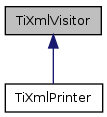TiXmlVisitor Class Reference
#include <tinyxml.h>
List of all members.
Detailed Description
If you call the Accept() method, it requires being passed a TiXmlVisitor class to handle callbacks. For nodes that contain other nodes (Document, Element) you will get called with a VisitEnter/VisitExit pair. Nodes that are always leaves are simple called with Visit().
If you return 'true' from a Visit method, recursive parsing will continue. If you return false, no children of this node or its sibilings will be Visited.
All flavors of Visit methods have a default implementation that returns 'true' (continue visiting). You need to only override methods that are interesting to you.
Generally Accept() is called on the TiXmlDocument, although all nodes suppert Visiting.
You should never change the document from a callback.
- See also:
- TiXmlNode::Accept()
Definition at line 141 of file tinyxml.h.
Constructor & Destructor Documentation
| virtual TiXmlVisitor::~TiXmlVisitor |
( |
|
) |
[inline, virtual] |
Member Function Documentation
| virtual bool TiXmlVisitor::Visit |
( |
const TiXmlUnknown & |
|
) |
[inline, virtual] |
| virtual bool TiXmlVisitor::Visit |
( |
const TiXmlComment & |
|
) |
[inline, virtual] |
| virtual bool TiXmlVisitor::Visit |
( |
const TiXmlText & |
|
) |
[inline, virtual] |
| virtual bool TiXmlVisitor::VisitEnter |
( |
const TiXmlDocument & |
|
) |
[inline, virtual] |
| virtual bool TiXmlVisitor::VisitExit |
( |
const TiXmlElement & |
|
) |
[inline, virtual] |
| virtual bool TiXmlVisitor::VisitExit |
( |
const TiXmlDocument & |
|
) |
[inline, virtual] |
The documentation for this class was generated from the following file:
